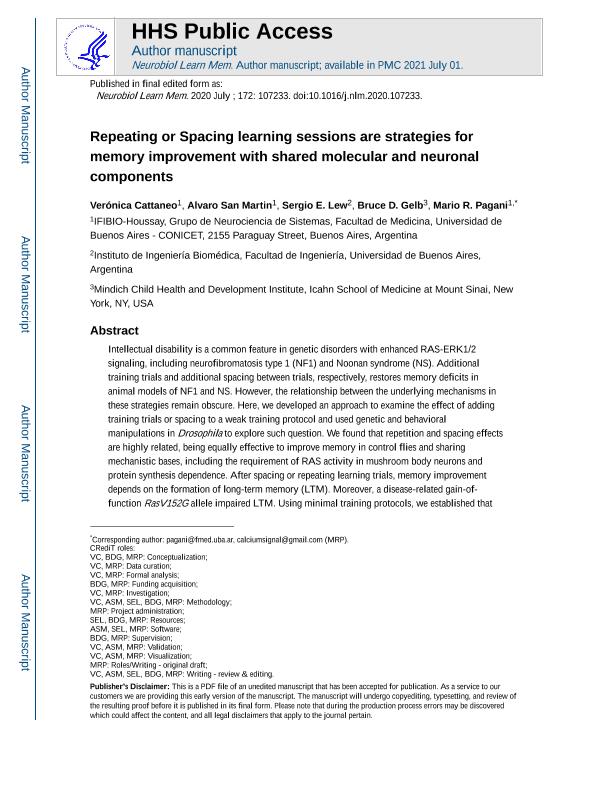Artículo
Repeating or spacing learning sessions are strategies for memory improvement with shared molecular and neuronal components
Fecha de publicación:
07/2020
Editorial:
Academic Press Inc Elsevier Science
Revista:
Neurobiology of Learning and Memory
ISSN:
1074-7427
Idioma:
Inglés
Tipo de recurso:
Artículo publicado
Clasificación temática:
Resumen
Intellectual disability is a common feature in genetic disorders with enhanced RAS-ERK1/2 signaling, including neurofibromatosis type 1 (NF1) and Noonan syndrome (NS). Additional training trials and additional spacing between trials, respectively, restores memory deficits in animal models of NF1 and NS. However, the relationship between the underlying mechanisms in these strategies remain obscure. Here, we developed an approach to examine the effect of adding training trials or spacing to a weak training protocol and used genetic and behavioral manipulations in Drosophila to explore such question. We found that repetition and spacing effects are highly related, being equally effective to improve memory in control flies and sharing mechanistic bases, including the requirement of RAS activity in mushroom body neurons and protein synthesis dependence. After spacing or repeating learning trials, memory improvement depends on the formation of long-term memory (LTM). Moreover, a disease-related gain-of-function RasV152G allele impaired LTM. Using minimal training protocols, we established that both learning strategies were also equally effective for memory rescue in the RasV152G mutant and showed non-additive interaction of the spacing and repetition effects. Memory improvement was never detected after Ras inhibition. We conclude that memory improvement by spacing or repeating training trials are two ways of using the same molecular resources, including RAS-ERK1/2-dependent signaling. This evidence supports the concept that learning problems in RAS-related disorders depend on the impaired ability to exploit the repetition and the spacing effect required for long-term memory induction.
Palabras clave:
DROSOPHILA
,
MEMORY IMPROVEMENT STRATEGIES
,
MEMORY RESCUE
,
RASOPATHIES
Archivos asociados
Licencia
Identificadores
Colecciones
Articulos(IFIBIO HOUSSAY)
Articulos de INSTITUTO DE FISIOLOGIA Y BIOFISICA BERNARDO HOUSSAY
Articulos de INSTITUTO DE FISIOLOGIA Y BIOFISICA BERNARDO HOUSSAY
Citación
Cattaneo, Verónica; San Martín, Alvaro; Lew, Sergio Eduardo; Gelb, Bruce D.; Pagani, Mario Rafael; Repeating or spacing learning sessions are strategies for memory improvement with shared molecular and neuronal components; Academic Press Inc Elsevier Science; Neurobiology of Learning and Memory; 172; 7-2020; 1-11
Compartir
Altmétricas




